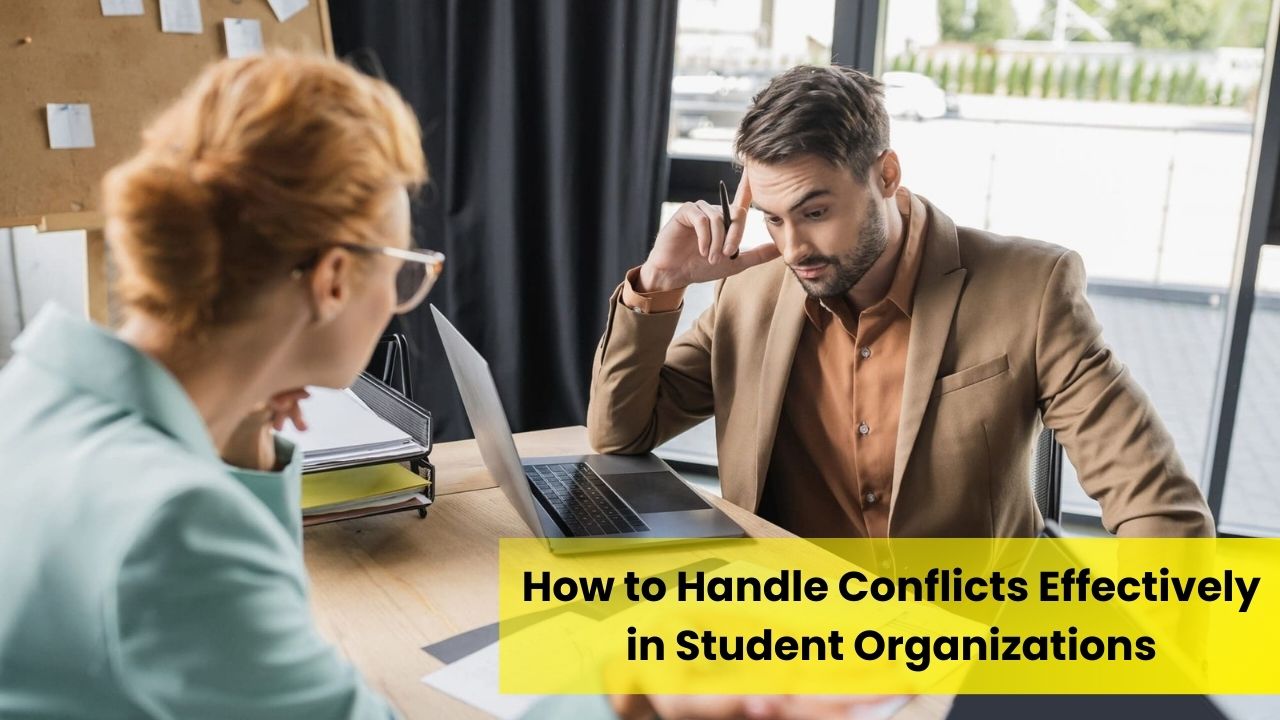Conflict is a natural part of any institution dynamic, and student organizations are no exception. Whether it’s disagreements approximately occasion planning, leadership roles, or communication breakdowns, conflicts can get up even inside the maximum enthusiastic and collaborative student agencies. While many human beings view warfare as poor, it is able to honestly be an opportunity for boom, creativity, and more potent teamwork—if treated efficaciously.
Understanding the Nature of Conflict
Conflict does no longer necessarily mean hostility. In student agencies, it often emerges from variations in perspectives, values, or dreams. Recognizing that disagreements are normal—or even healthful—can assist people technique war with an open and optimistic mind-set.
Common Causes of Conflict in Student Organizations
- Role Ambiguity – Unclear obligations regularly cause overlapping responsibilities and frustration.
- Communication Gaps – Misunderstandings can quickly amplify while statistics isn’t always shared genuinely.
- Differences in Priorities – Members can also disagree approximately which tasks, events, or issues deserve interest.
- Personality Clashes – Conflicting work styles or interpersonal differences can stress relationships.
- Competition for Leadership Roles – Ambition and recognition now and again spark tensions amongst members.
Strategies for Handling Conflicts Effectively
1. Encourage Open Communication
The first step in resolving conflict is to create a safe area for speak. Encourage participants to explicit their thoughts and emotions without worry of judgment. Active listening—listening to what the other individual is saying with out interrupting—is simply as critical as talking brazenly.
2. Focus on the Issue, Not the Person
Conflicts often become private while emotions run excessive. To save you this, individuals ought to separate the trouble from the man or woman. Instead of announcing, “You by no means complete your paintings on time,” reframe it as, “The deadline wasn’t met, and it affected the mission timeline. How can we keep away from this in the destiny?”
3. Use Mediation When Needed
Sometimes conflicts increase beyond the ability of individuals to remedy them by myself. In such instances, a impartial 1/3 party—such as the club president, school marketing consultant, or some other relied on member—can step in to mediate and guide the discussion towards a honest answer.
4. Set Clear Roles and Expectations
Prevention is better than therapy. Clearly defining roles, duties, and expectations at the beginning of a mission reduces the probabilities of warfare. A shared calendar, written suggestions, or meeting mins can assist keep transparency.

5. Practice Empathy
Understanding where the alternative person is coming from can diffuse anxiety. Encouraging individuals to put themselves in each different shoes builds compassion and creates a cooperative environment.
6. Create a Problem-Solving Mindset
Conflicts can be reframed as possibilities to enhance the enterprise. By focusing on answers as opposed to blame, organizations can flip disagreements into optimistic discussions that cause higher results.
7. Agree on Actionable Solutions
A battle decision method must cease with clear, actionable steps. For instance, if verbal exchange was the issue, the institution might determine to time table weekly take a look at-ins or use a shared messaging platform to maintain anybody informed.
Communication Techniques for Conflict Resolution
Strong communique is on the coronary heart of conflict resolution. Students ought to exercise those techniques:
- Active Listening: Pay interest to each phrases and feelings. Reflect back what the speaker says to verify expertise.
- Empathy: Try to apprehend the situation from the alternative man or woman’s perspective. Empathy builds trust and decreases defensiveness.
- Nonverbal Cues: Maintain open body language, eye contact, and a peaceful tone to inspire superb talk.
- Clarity in Expression: Avoid vague statements. Be specific approximately the trouble and preferred effects.
- Emotional Regulation: Stay calm and composed. Avoid responding in anger or frustration.
Long-Term Practices to Prevent Conflicts
Instead of anticipating conflicts to rise up, student agencies can adopt proactive practices:
- Team-Building Activities: Strengthen relationships through retreats, bonding activities, or workshops.
- Leadership Training: Equip leaders with skills in warfare control, conversation, and emotional intelligence.
- Clear Mission and Values: Reaffirming the enterprise’s shared cause facilitates align member dreams.
- Regular Feedback Systems: Anonymous surveys, notion bins, or open forums can allow contributors to elevate troubles early.
- Diversity and Inclusion Awareness: Respecting and celebrating variety reduces misunderstandings stemming from cultural or non-public variations.
Conclusion
Conflicts in student groups are herbal and, whilst controlled successfully, can become possibilities for boom. By addressing problems early, fostering open conversation, the use of structured resolution strategies, and promoting a culture of appreciate, scholar agencies can flip conflicts into mastering reviews.
For students, these abilities extend a ways past campus life—they’re crucial gear for navigating personal relationships and expert careers. Effective struggle management complements teamwork, strengthens leadership, and prepares students to thrive in diverse environments. Student organizations that embrace warfare as a catalyst for improvement will not most effective characteristic smoothly but also equip their contributors with life-long interpersonal skills.
FAQ’s
Is battle constantly harmful to pupil companies?
Not always. Constructive war can spark creativity, innovation, and higher choice-making if treated nicely.
What have to a scholar leader do if a warfare escalates past manipulate?
In such instances, involving a neutral mediator like a college advisor or pupil affairs expert is usually recommended.
How can scholar businesses prevent conflicts from recurring?
By putting clear expectancies, preserving open verbal exchange, and fostering a way of life of appreciate and inclusion.
Why is it important for students to learn war decision?
Because these abilities put together them for real-world challenges in workplaces, communities, and personal relationships.

